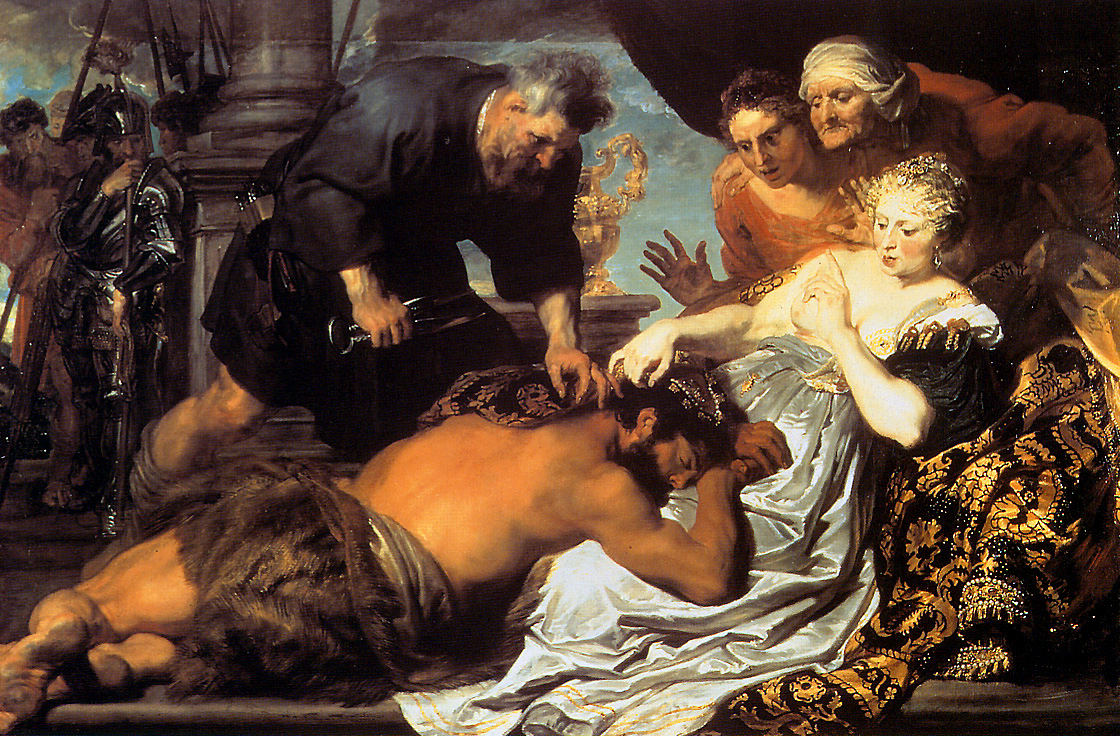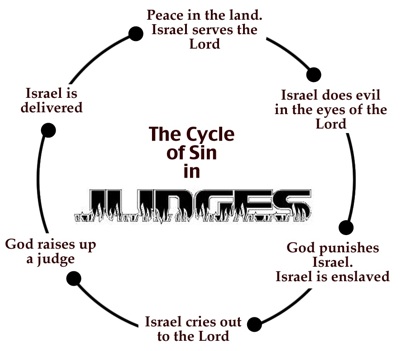 Toward the end of the period of the judges lived one of the most famous judges, Samson. He lived from approximately 1089 BC to 1049 BC. The story of Samson begins in chapter 13, which is where we pick up the narrative.
Toward the end of the period of the judges lived one of the most famous judges, Samson. He lived from approximately 1089 BC to 1049 BC. The story of Samson begins in chapter 13, which is where we pick up the narrative.
In verse 1, we learn that God is once again punishing Israel by allowing them to be ruled over by the Philistines. Who were the Philistines? According to F. Duane Lindsey in The Bible Knowledge Commentary, the
Philistines arrived in large numbers during the invasion of the Sea Peoples about 1200 B.C. They organized a pentapolis or confederation of five cities—Gaza, Ashkelon, and Ashdod on the strategic coastal highway, and Gath and Ekron on the edge of the Shephelah or Judean foothills (cf. Josh. 13:3). When the Philistine aggression moved eastward into the land of Benjamin and Judah, the Israelites accepted that domination without resistance (cf. 14:4; 15:11) till the time of Samuel (cf. 1 Sam. 7:10–14).
For what evil was Israel being punished? Serving the false gods of the Canaanites instead of serving the one true God who brought them out of Egypt and into the Promised Land.
After 40 years under Philistine rule, God is going to bring a deliverer forth to begin to rescue his people from the Philistines. The angel of the Lord appears to a Danite woman who is barren and tells her that she will conceive and birth a child who will be dedicated to God for his entire life. The boy would be a Nazirite (see Numbers 6:1-21), which meant that he was never to cut his hair, he was to abstain from drinking any alcohol, and he was never to have contact with a corpse.
Notice that verse 5 says that he will only begin to deliver Israel from the Philistines, a modest pronouncement. The final defeat of the Philistines would be left to Samuel (1 Sam. 7:10–14) and David (2 Sam. 5:17–25). Immediately we are suspicious that this particular judge will not live up to the potential he has.
One would expect that a man dedicated to God before his birth, a man who was a divinely appointed deliverer of Israel, would lead an exemplary and godly life. Instead, we will see that Samson is a deeply flawed man who personifies all that is wrong with Israel.
In chapters 14-15, the writer records several incidents from Samson’s life. We learn that God gives Samson supernatural physical strength at particular times. Due to this God-given strength, Samson personally kills hundreds of Philistines and becomes a “leader” of Israel. What is interesting is that Samson never leads others into battle or appears to administer the affairs of Israel in any official way. He simply keeps the Philistines at bay because they are scared of him as an individual. Daniel Block, in Judges, Ruth: An Exegetical and Theological Exposition of Holy Scripture (The New American Commentary), summarizes Samson’s life:
No other deliverer in the Book of Judges matches his potential. Called prenatally by Yahweh, stirred as a youth by the Spirit of Yahweh, empowered with extraordinary gifts by Yahweh, and granted exceptional opportunities for heroism by Yahweh, the narrator devotes more attention to Samson than to any other deliverer. Despite all these advantages and this special attention, Samson accomplishes less on behalf of his people than any of his predecessors. . . . Though Samson is impressive as an individual, he turns out to be anything but a military hero. He never leads Israel out in battle; he never engages the Philistines in martial combat; he never experiences a military victory. All his accomplishments are personal; all his victories, private.
As we begin chapter 16, we learn that Samson forms a relationship with a Philistine woman named Delilah. The rulers of the Philistines bribe Delilah to discover Samson’s source of physical strength. Three times Delilah begs to know Samson’s secret, and three times he lies to her.
Finally, the fourth time she asks, Samson reveals that he has been dedicated to God since birth, and this is symbolized by the fact that his hair has never been cut. If his hair is cut, his physical strength will be like that of any other man.
Samson falls asleep and Delilah cuts his hair. The Philistine rulers overpower him and carry him off as a prisoner. His eyes are gouged out and he is kept as a slave doing hard labor.
In verses 23-31, Samson is brought before a large number of Philistine leaders at a temple to entertain them. In his last act, he asks God for physical strength one more time so that he can knock down two columns that support the temple roof, thus killing all of the people on the roof of the temple. What a sad end to a life with so much potential.
What are we to make of Samson’s story? Daniel Block invites us to compare Samson to the nation of Israel:
Samson is a Wunderkind, miraculously born by the will of God. Samson is called to a high life of separation and devotion to Yahweh. Samson has a rash, opportunistic, and immature personality. Samson is inexorably drawn to foreign women, like Israel was drawn to foreign gods (both ‘play the harlot’). Samson experiences the bondage and oppression of the enemy. Samson cries out to Yahweh from his oppression. Samson is blinded (cf. 1 Sam 3:1–3). Samson is abandoned by Yahweh and does not know it.
Samson, as the “greatest” deliverer of Israel during the time of the judges, is a great disappointment. Contrast him to the greatest deliverer of Israel and all mankind, Jesus Christ. Jesus was a Wunderkind born by the will of God who fulfilled all of his potential. He perfectly obeyed God the Father in everything and defeated man’s greatest enemies, sin and death.
 The Book of Judges continues the historical narrative where Joshua ended. The author of Judges is unknown, although Jewish tradition ascribes authorship to the prophet Samuel. Samuel may have written portions of the book, but there were likely later editors that compiled it into its final form. Scholars date the final composition of Judges from some time between 700 and 1000 BC.
The Book of Judges continues the historical narrative where Joshua ended. The author of Judges is unknown, although Jewish tradition ascribes authorship to the prophet Samuel. Samuel may have written portions of the book, but there were likely later editors that compiled it into its final form. Scholars date the final composition of Judges from some time between 700 and 1000 BC.